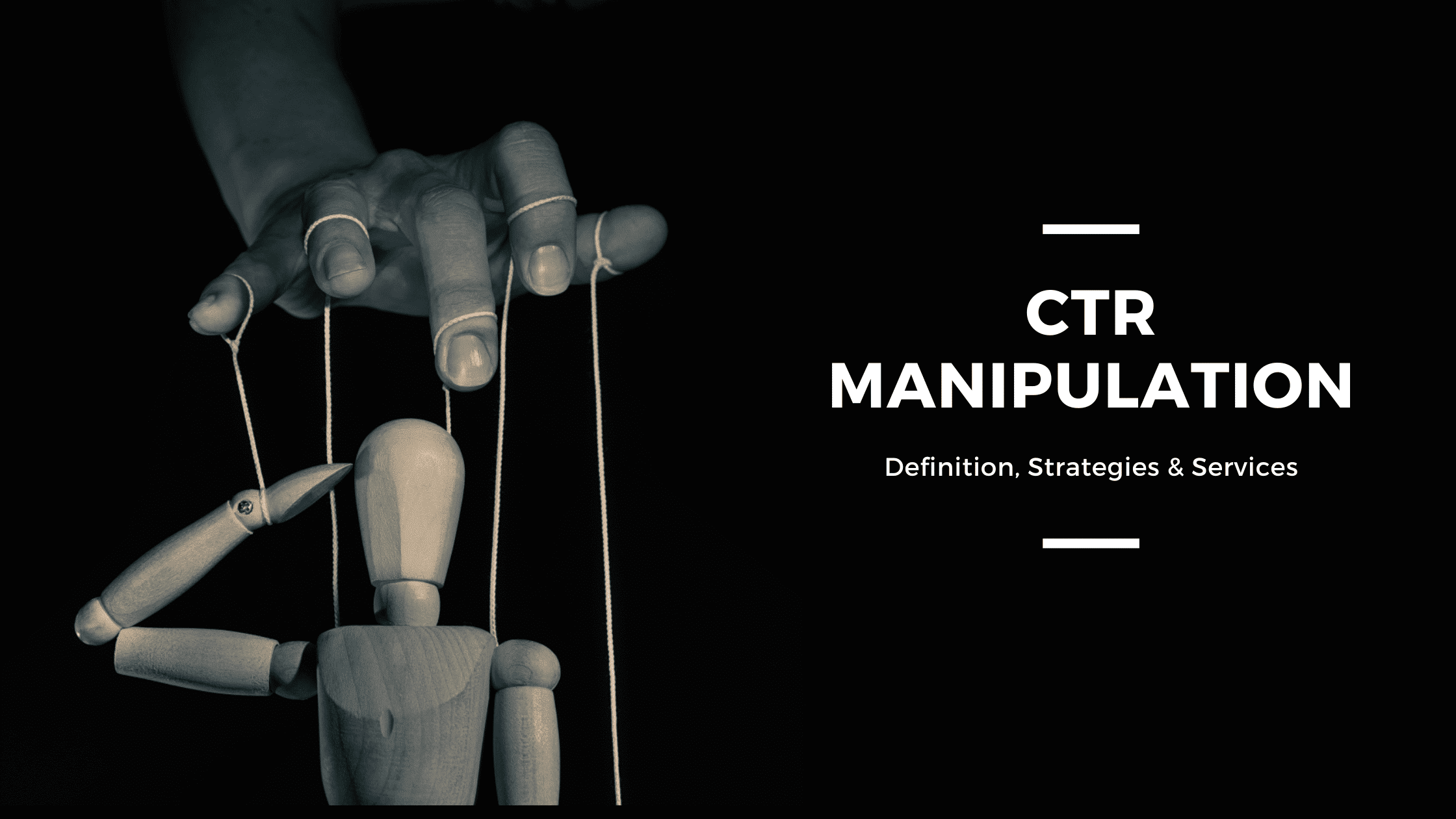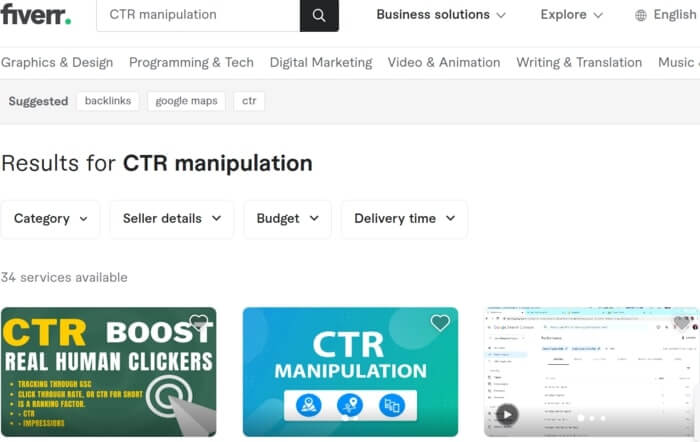CTR Manipulation: The Key to Controling Search Results
In the affordable landscape of electronic advertising, Click-Through Rate (CTR) manipulation has emerged as a crucial strategy for improving presence in search results. While the appeal of boosted engagement via luring headings is obvious, the prospective effects and honest ramifications warrant cautious factor to consider. A much deeper expedition right into the mental elements affecting CTR, along with efficient and sustainable strategies, reveals an intricate interplay between immediate gains and long-lasting trust fund. What strategies can be employed to guarantee that adjustment does not jeopardize integrity? The responses might redefine exactly how we approach digital involvement.
Recognizing Click-Through Price
Recognizing click-through rate (CTR) is necessary for reviewing the performance of electronic marketing projects. CTR is defined as the ratio of individuals that click a certain link to the overall number of individuals that view a advertisement, email, or web page. This metric functions as a crucial sign of involvement and the relevance of web content to the target market.
A greater CTR generally signifies that the marketing technique is successfully capturing interest and motivating action. Alternatively, a reduced CTR may show that the web content is not reverberating with individuals, motivating a demand for analysis and possible modification. Variables affecting CTR include the quality of advertisement copy, visual appeal, and the importance of keywords.
Social media ads may yield different CTRs contrasted to look engine outcomes. Thus, a comprehensive understanding of CTR is fundamental for driving conversions and achieving organization purposes in the competitive digital landscape.
The Psychology Behind CTR
Leveraging emotional concepts can considerably enhance the performance of click-through rate (CTR) techniques. Recognizing the cognitive predispositions and emotional triggers that affect customer habits is crucial in crafting material that resonates with target markets. The concept of shortage produces seriousness; customers are a lot more likely to click on web links that suggest restricted accessibility or time-sensitive deals.
Furthermore, social evidence plays an essential duty in decision-making. When users observe others involving with material-- such as via high ratings or reviews-- they are more probable to comply with match, reinforcing the value of presenting positive responses plainly.
Additionally, attracting interest can drive clicks; intriguing headlines that stimulate questions or emphasize unusual realities compel customers to look for answers.
Additionally, familiarity types trust fund. Regular branding and style across systems instill self-confidence, making individuals more inclined to click familiar sources.
Techniques for CTR Improvement
Efficient methods for enhancing click-through rates (CTR) are vital for maximizing on-line involvement and driving web traffic. In addition, using persuasive language in meta summaries to highlight distinct selling points can better increase CTR.
One more method includes using rich snippets, such as celebrity rankings, images, or various other aesthetic components in search engine result. These enhancements not only record customer interest yet likewise supply beneficial info at a glimpse, making the listing extra appealing.
Incorporating a sense of urgency or exclusivity in contact us to activity can also improve CTR. Phrases like "minimal time offer" or "sign up with currently" can trigger immediate action from possible visitors.
Additionally, leveraging A/B screening enables marketing experts to continuously refine and enhance their approaches. By examining various headlines, descriptions, and visual elements, companies can determine what reverberates finest with their audience.

Measuring CTR Effectiveness
Measuring the performance of click-through rate (CTR) strategies is essential for evaluating the success of on-line projects. An extensive technique to assessing CTR involves evaluating both measurable and qualitative metrics. Start by tracking the general CTR, which is computed by dividing the number of clicks by the variety of perceptions. This fundamental statistics supplies insights right into the performance of certain advertisements or material pieces.

Additionally, think about the context of the CTR. If it does not lead to conversions, a high CTR does not always correspond to success. GMB CTR Manipulation. Integrating CTR data with conversion prices supplies an extra all natural view of performance. Eventually, continual tracking and modification based upon CTR effectiveness is essential for optimizing the impact of electronic advertising and marketing techniques and attaining lasting success.
Moral Considerations in CTR Control
Browsing the realm of click-through rate (CTR) adjustment increases substantial moral considerations that online marketers need to attend to. While enhancing CTR can improve presence and interaction, it likewise presents the danger of misleading customers. Ethical advertising methods require transparency and sincerity; consequently, adjusting CTR through misleading techniques, such as clickbait headlines or misrepresentative content, can deteriorate count on and damages brand name track record.
Furthermore, making use of artificial ways to inflate CTR-- such as utilizing bots or incentivizing clicks-- can breach system plans and result in fines, additionally emphasizing the importance of moral compliance. Marketing professionals should think about the long-lasting implications of their techniques on consumer relationships and the general integrity of the check this digital market.
Furthermore, the ethical landscape encompasses the more comprehensive ramifications of data privacy. Gathering customer information for CTR optimization without educated permission elevates significant moral worries. It is critical for online marketers to participate in responsible data practices, making certain that customer privacy is valued.
Inevitably, honest considerations in CTR adjustment require an equilibrium between business goals and the dedication to transparency, honesty, and respect for consumer rights. By focusing on moral methods, online marketers can foster lasting development while preserving trust and reliability in the try this out electronic space.
Conclusion
To conclude, while CTR adjustment may supply immediate visibility and involvement advantages, it positions substantial risks to lasting trust and conformity with online search engine standards. Lasting electronic marketing strategies have to focus on honest methods and real customer engagement, making certain placement with customer passions. A well balanced technique that emphasizes transparency over misleading strategies will inevitably promote lasting success in search result dominance, securing brand names against possible penalties and reputational damage.
In the affordable landscape of digital advertising and marketing, Click-Through Price (CTR) manipulation has arised as an essential strategy for boosting presence in search results. CTR is defined as the proportion of customers who click on a particular web link to the overall number of customers that check out a e-mail, page, or ad . On the other hand, a low CTR might suggest that the material is not reverberating with customers, motivating a demand for analysis and possible adjustment.Navigating the realm of click-through rate (CTR) adjustment raises substantial moral factors to consider that marketing experts should deal with. Accumulating user data for CTR optimization without informed authorization elevates significant moral concerns.